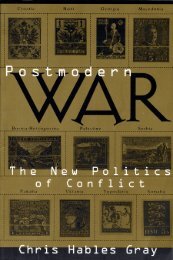6. Modern War - Chris Hables Gray
6. Modern War - Chris Hables Gray
6. Modern War - Chris Hables Gray
You also want an ePaper? Increase the reach of your titles
YUMPU automatically turns print PDFs into web optimized ePapers that Google loves.
<strong>Modern</strong> <strong>War</strong> [ 115 ]<br />
1829, cable/telegraph networks were established. In the 1840s rifled artillery<br />
was perfected. In 1848 the Prussians moved a complete army corps by train in<br />
an exercise. In 1850 Morse code was devised (Brodie, 1973, p. 12).<br />
During The Crimean <strong>War</strong>, 1853-1856, torpedoes, trench war, the war<br />
telegraph, steam driven floating batteries, and females nurses were all introduced.<br />
The telegraph even allowed distant officials in London and Paris to<br />
interfere in tactical operations "hour by hour in order to save losses and<br />
political credibility" (p. 17). But it was in the United States that modern war<br />
first reached its full development.<br />
The American Way of <strong>War</strong><br />
America is one of the most warlike nations on earth.<br />
—Billy Mitchell (quoted in Franklin, 1988, p. 99)<br />
Americans have always looked to science for their answers, in<br />
war as in everything else.<br />
—Thomas and Barry (1991, p. 39)<br />
Geoffrey Perrat, in his history of the United States, A Country Made by <strong>War</strong>,<br />
traces the growth of the twentieth century's dominant world power in terms<br />
of the constant wars and militarizations that have made it possible. Now it<br />
is true that this image doesn't fit the self-conception of the average U.S.<br />
citizen, but the history is clear. Just consider how much of U.S. territory was<br />
won through war or how many presidents were war heroes.<br />
Of course, the very founding of the Republic was through war, and a<br />
very interesting war at that. It marked the first successful anti-colonial<br />
revolution, as well as the first victory of an unconventional people's army<br />
over an established modern army. Is it any wonder that the British band<br />
played "The World Turned Upside Down" at their Yorktown surrender?<br />
Most of the U.S. wars have been colonial. The most common were the<br />
hundreds of Indian battles and massacres whose end results were often<br />
genocidal, although in the early years the colonists were sometimes hard<br />
pressed (Steele, 1996). These wars were very important, despite their neglect<br />
by most military and social historians. In the Americas, in Africa, in Asia,<br />
and in Australia, the Europeans and the emigrant Europeans waged a long<br />
series of conflicts, often trying out new weapons and technologies.<br />
In the United States advanced signaling, repeating rifles, and machine<br />
guns were all used extensively in various Indian wars. In most cases the<br />
strategy of total war was applied.<br />
The Mexican-American <strong>War</strong> of 1846-1848 was a break from the Indian<br />
campaigns. The U.S. victory owed something to the growing industrial might








